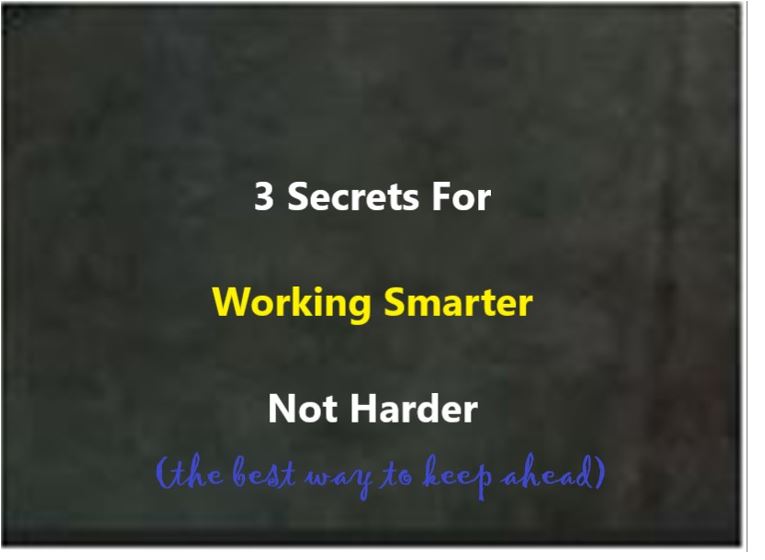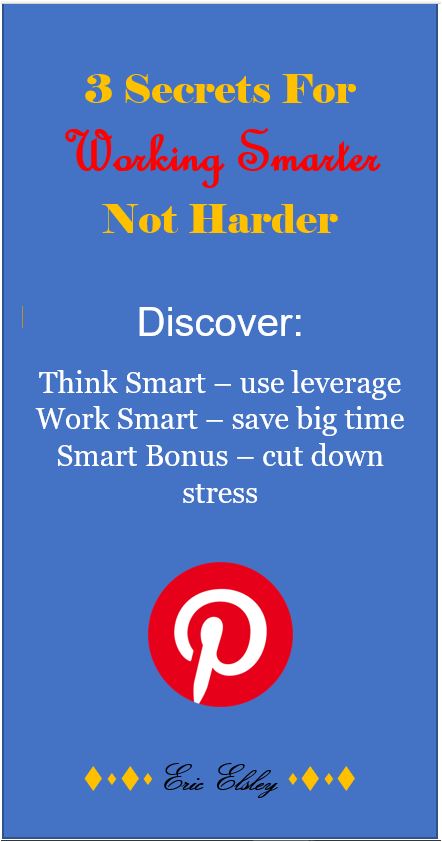2. Work Smart – create small changes to make big time gains
3. Smart Bonus – increase efficiency to cut down pressure and stress

I believe that working smarter not harder is important for most staff. With the pace of technology change and the trend of continuous improvement it is important to know how to beat the working blues driven by too much change and uncertainty.
Even more important is to know how to become more efficient to keep your boss happy while minimising your own effort. Please keep an open mind as many of the ideas I am suggesting are counterintuitive. Make sure you read this whole post before you start to judge if you think this system will work for you.

I used to work in the information technology (IT) section of a busy regional library service with 15 branch libraries.
Along with my IT work I was responsible for performance reporting which included delivering many statistical reports. Since much of my work with statistics had to be delivered within a short timeframe (generally 4-6 days), I felt the added pressure of a tight deadline which in turn increased my stress levels.
I was learning statistics and trying to keep up with changes in IT that were happening often. Stress built up and I had a heart attack. My ECG readout was called a Tombstone reading. That meant I very nearly died. Luckily for me I made it to the hospital quickly after my heart attack to receive fast treatment. I was sweating so much the nurses had trouble getting the ECG pads to stick to my body.
When they saw the ECG readout I was whisked away and was given a clot busting injection that saved my life. Later I found out I had a 90% blockage plus a clot. No wonder it was very painful. After I was stabilised, I spent some days in Intensive Care waiting and was eventually had an angiogram then a stent was inserted near my heart to solve the problem. That was brilliant and I was released the next day. The doctor gave me one week off work to recuperate. I knew that something had to change with the way I worked so that I did not get to stressed again.
1. Think Smart – To Minimise Your Effort Required With Leverage

An opportunity presented itself when I read a book called “80/20 Principle” by Richard Koch. It suggested that 20% of our activity gave us 80% of our results. To me this meant some things we do are much more productive than others. Richard showed me a smarter way to think was required first which would lead to a smarter way to work. That in turn would lead to efficiency gains in the long run.
My plan was to focus on the most important 20% of my work at the present time. For me this was the area in my work that was causing me the most problems which elevated the pressure and stress I felt. At the time that was my role keeping statistics for the 15 libraries in the service.
Statistics gathering was a task that I had to do each month and report them to my manager. It was repetitive work that required a high level of accuracy. That meant I had to be 100% focussed when doing these tasks. I was always removed from other rostered duties until I had completed my statistical reporting for the month as they were generally required urgently by my manager.
Let me give you an example of a 20% action that delivered an 80% improvement in results. After meeting my monthly deadline, I decided to evaluate my work with statistics to see where large efficiencies could be made with only small changes to my workflow.
When I exported statistics from our library system to excel a glitch would happen where 2 blank rows appeared between each row of data. Now consider that some of these reports were ending up 156 pages long with the blank lines included. It was a real struggle to delete all the empty rows and often took from 10-20 minutes per report. I decided to research on the web for a quicker way. There was a way which saved heaps of time but it was a little tricky. I persevered and found a way to make it work every time. Wow, the rows could all be deleted in around 45 seconds.
As I ran more than 10 reports each month with this problem the time savings soon added up. The 80/20 Principle that Richard wrote about was the factor that focussed me to smarter work practices. It also delivered huge leverage to my efforts by multiplying the return on my small workflow change. What I found was that not only did I save a considerable amount of time that month on all 10 reports but I also saved the same amount of time each month from then onwards.
2. Work Smart – Create Small Changes To Make Big Time Gains
It took me about 50 minutes to research my problem and test it a few times making modifications to the procedure to have it work brilliantly every time. This gave me a huge leap in efficiency (with top accuracy) which was a real help as statistics work was repetitious, tedious and always had tight deadlines as they were required for further reports to top level management.
I will show the approximate time saved by this workflow change.
Time Invested / Saved In First Month

Net Time Saved Per Year

Return On Time Invested

3. Smart Bonus – Increase Efficiency To Cut Pressure & Stress
The time saving also helped me to meet the deadline more easily. It reduced my stress levels which allowed me to work even more efficiently. Have you noticed that when you are stressed it slows you down…when I was stressed out, I could not work at my normal pace.
It has occurred to me that each time I make use of the 80/20 Principle it improves my efficiency, saves me time (not first off but in the long run). I found an extra benefit was to boost my morale and self-esteem because I had found a better way to speed up my work and deliver results faster without noticing an increase in pressure or stress.
Just imagine the difference you could make to your efficiency at work if you were able to implement one tiny 80/20 change per week or even per month. As change is happening very fast in business it seems counterintuitive to think that the solution to pressure and stress brought about by change is for us to embrace tiny changes in our workflow to make us more productive. This way we are counter acting the pressure and stress brought on by change and continuous improvement / efficiency programs.
I hope this article will assist you to work smarter not harder and still achieve valuable efficiency gains.
A small request: If you liked this web page, please share it?
I know some people don’t share because they feel that website owners don’t need their “small” social share.
But here’s the thing…
A share from you would seriously help a lot with the growth of this site.
It won’t take more than 10 seconds of your time. The share buttons are right here.
Thank you so much!
Regards,
Eric Elsley
Work Less & Achieve More




